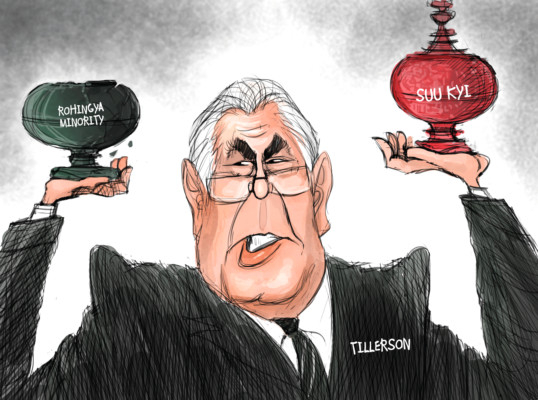
United States Secretary of State Rex Tillerson is heading to Myanmar this week, where he’ll be meeting Aung San Suu Kyi, the former dissident who has effectively become her country’s senior leader. It’s going to be a fraught encounter.
Aung San Suu Kyi will have the unpleasant task of explaining why her country’s security forces have just staged a violent campaign that has driven more than 600,000 people — members of the beleaguered Muslim Rohingya minority — into neighbouring Bangladesh. Tillerson will have to convey Washington’s intense concern about the situation without prompting a collapse in its ties to Burma, which is both a fragile young democracy and a place of great geopolitical significance.
Myanmar is now at a more consequential crossroads politically than it was in 2015, when Suu Kyi’s party swept into power on the wave of a popular vote, or 2011, when the military first convened a semi-civilian parliament following the first national elections in two decades. Democratic institutions have had little time to take root. The constitution (which dates back to the days of the old junta) still gives sweeping powers to the military.
If the US and its western allies condemn Myanmar too harshly, they could end up empowering the military, which might conclude that it has nothing to lose by re-asserting is dominance over Suu Kyi. Even if the generals don’t go that far, they may well seek closer embrace of India and China. This could delay or derail Myanmar’s progress towards a freer society.
Suu Kyi’s position is critical. Awarded the Nobel Peace Prize for her resistance to the old military dictatorship, she has long been lauded as the living symbol of her nation’s yearning for democracy. Now, her legacy has been seriously tarnished by her refusal to condemn those within her own government who are behind the killings, rapes and acts of terror perpetrated against the Rohingya in northwestern Rakhine state since late August.
How should the US respond? Above all, it must remain engaged and pragmatic, and it should focus on supporting Myanmar’s nascent democratic institutions. Suu Kyi earned ferocious international criticism for a televised speech she had made in September. She refrained from condemning the violence against the Rohingya and claimed that the government needed more time to investigate the events.
However justified the criticism may be, Tillerson should parse Suu Kyi’s words carefully. Former US ambassador Derek Mitchell said he believes the Myanmarese leader is signalling an openness to cooperating with foreign governments and international aid organisations, but she must balance this openness with raging Buddhist nationalism among the ethnic majority Myanmarese population, even as she strives to keep the trust of the country’s long-dominant military.
Foreign aid agencies and diplomats should seek ways to support local civil-society organisations that promote inter-ethnic and religious dialogue. While in Myanmar, Tillerson should seek out potential areas of cooperation with Suu Kyi’s party on bringing peace and stability to Rakhine state. Among the most urgent aims: Negotiating access for humanitarian relief to afflicted populations and launching efforts to resettle divided communities, which have seen Rohingya as well as Rakhine Buddhists uprooted by violence.
Such moves require care. The Myanmarese people are extremely wary of the motives of international organisations and perceive western media as biased in favour of international Islamic movements. The Buddhist majority is increasingly turning away from its long-held positive views of the West amid the current crisis.
All this plays into the hands of the military. Deeply resented after decades of oppressive rule, the military is now growing in popularity. This shift in attitudes, bolstered by anti-Rohingya violence and pro-Buddhist nationalism, could spell disaster for Suu Kyi and her party.
Tillerson should underscore that the US government supports Suu Kyi’s party’s efforts to restore peace and order in Rakhine state and will not condone rights abuses committed by the military. But he should also stress that the US still places its trust in Suu Kyi and remains committed to its support for democratic institutions.
If the US State Department is serious about maintaining influence in Myanmar and supporting the country’s democratic consolidation, it should act swiftly by backing proposals to repatriate Rohingya who have fled to Bangladesh and to provide them with a path to citizenship, something they have long been denied by discriminatory laws.
Washington should step up its efforts to strengthen civil-society organisations, peacekeepers and inter-faith groups in Myanmar, all of which reinforce a democratic citizenry and will increase the chances of a stable political transition in the long run.
— Washington Post
Hunter Marston is a senior columnist and a Washington-based analyst of Southeast Asian politics.










